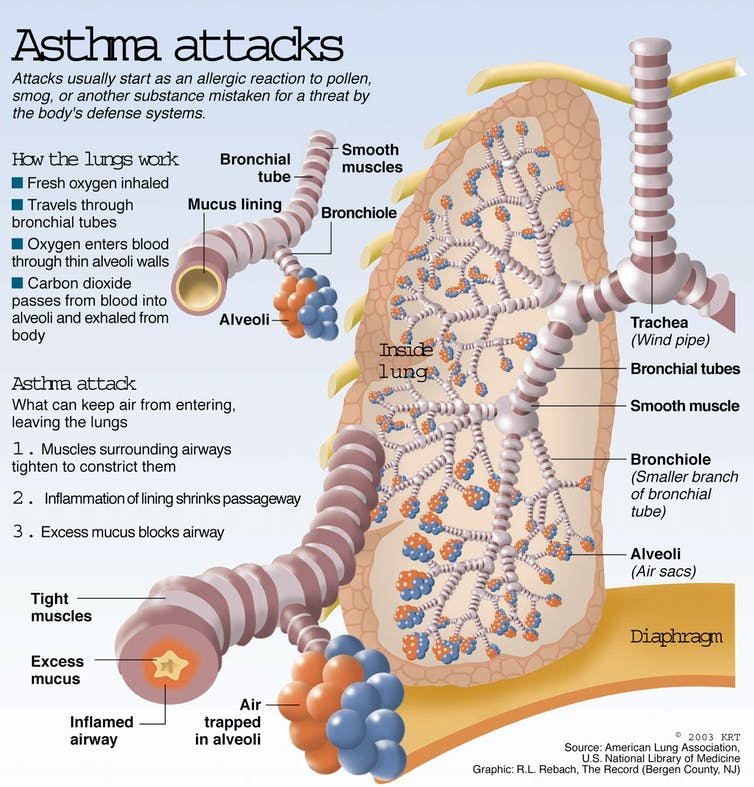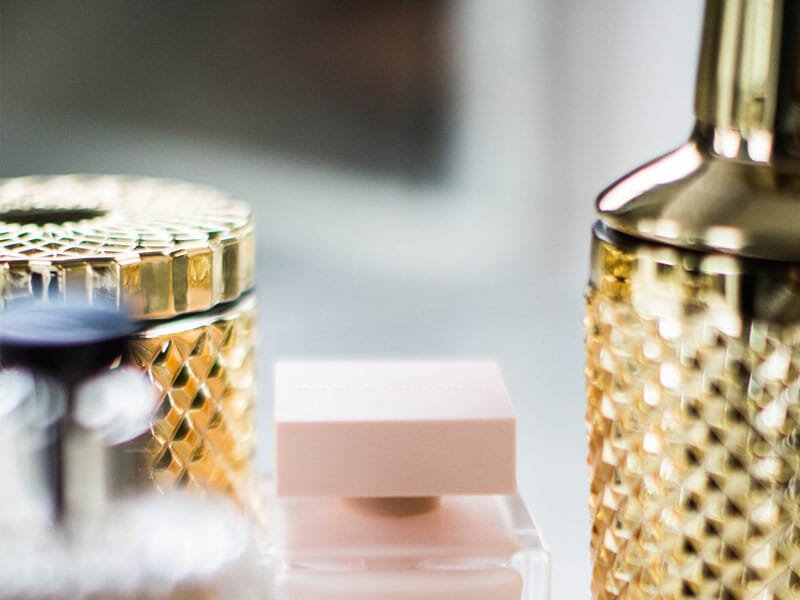Convincing Others About Fragrances
Ideally, everyone in your life would stop spraying themselves with fragrance, taking you into candle stores, and cease scenting up their homes. Unfortunately, this is not always the case. There will always be people who choose to drench themselves and their homes in fragrance. You may have to spend less time with these people and in their homes for the sake of your health. That being said, there might be people in your life that simply might not fully understand your asthma or your reaction to fragrances.
It is likely that you have already tried to discuss what triggers your asthma. If this isn’t enough, then sharing additional reasons why quitting fragrance would be beneficial to them could be the turning point. Sharing this article or the cons of using fragrances may be a good place to start.
Talking To A Partner About Asthma And Sex
People with asthma tell us it can feel embarrassing to talk about how their asthma might affect intimacy and sex, especially with a new partner.
But its worth taking the time to talk about your asthma openly – much better that your partner knows about your asthma beforehand, rather than trying to explain your symptoms at the time.
Perhaps say:
So, my asthma can sometimes be triggered by sex. I can manage it, I just wanted to let you know.
Im going to leave my inhaler by the bed in case I need it.
Can we try this position instead? It means I can breathe more easily.
What About Everyone Else
There are many groups and manufacturers that will tell us that a given product is harmless, because it only contains a low dose of chemicals. It could be possible that for many, a small amount of fragrance does not effect them. Yet, maybe we need to take into account simultaneous exposure to multiple products and for long periods of time, as well as increased susceptibility, due to compromised immunity, stress and/or other environmental factors?
Even if the general population isnt likely to suffer acute effects from exposure to fragrances, there are long-term chronic health effects connected to these chemicals that we dont fully understand yet, says Loewenherz, an industrial hygienist for the New York Committee for Occupational Safety and Health. In all, as we are mindful of those who do have reactions for whatever reasons, maybe we should consider our own health.
What about those frequent or occasional, unexplained headaches, dizziness, fatigue, sore throats, stuffy noses or lowered immunity? Could chemicals in the environment possibly have a part in these symptoms? After all, many say that, Synthetic fragrances are capable of causing a number of diseases, many of which a person may not equate to the product. For instance, Fragrances are a frequent trigger of migraine headaches and perfume can be a trigger to allergies and asthma.
Don’t Miss: How To Help With Asthma
Health Risks Of Perfumes And Fragrances
âAs mentioned earlier, most perfumes and fragrances are made of chemicals that can be harmful to your health. Many of these chemicals are also found in cigarette smoke. Inhaling some of these chemical fumes causes damage to the brain, bringing up headaches, sinus problems, dizziness, and some respiratory diseases. In addition, when applied directly to the skin, these chemicals enter the bloodstream after being absorbed through the skin from our clothes. Some of these chemicals can have a narcotic effect, which may cause some people to develop an addiction to their perfumes.
Fragrance Sensitivity: Allergy Symptoms Triggers & Treatment

Believe it or not, up to one-third of all adults deal with some type of fragrance sensitivity, which can trigger symptoms such as trouble breathing, headaches and skin irritation. In fact, the American Academy of Dermatology considers fragrances to be the leading cause of cosmetic contact contact dermatitis.
How do you treat fragrance sensitivity? As explained below, the best way to manage fragrance sensitivities or allergies is to rid your life of as many scented products as possible, especially those made with a multitude of synthetic chemicals, as many are.
The truth is it can be hard to avoid all scented products given how popular they are and because ingredient labels are not always transparent. Even some products that are labeled as unscented or fragrance free contain certain ingredients, such as oils or herbs, that can be irritating to some people.
That said, there are steps you can take to reduce your exposure to fragrances and minimize your reaction to them when avoiding them is impossible.
Read Also: Does Asthma Shorten Life Expectancy
How To Deal With Unwanted Fragrances In The Workplace
Nowadays, itâs easy to find yourself working in an office where rules and regulations protect everyone from exposure to fragrances. But what if your company doesnât have such policies?
Exposure to fragrances can make it difficult for some people to work effectively. Hereâs what you can do if your coworkerâs fragrance is too much.â
How To Avoid Scents Outside Of Your Home
- Use scent-free products when available.
- Keep your workspace or office well ventilated.
- Keep detergents and soaps in sealed containers or a cupboard with a door that completely closes. Make sure the room where they are stored is well ventilated.
- Ask if you can post a “Scent-free building” sign at your work, school and place of worship.
- If scent-free policies are not in place, work with your school, workplace, place of worship, or gym to adopt a scent-free or scent-reduced policy.
Also Check: Does Ibuprofen Make Asthma Worse
Fragrance As An Asthma Trigger
It seems many people who do not live with asthma, love their fragrances. There are scented lotions, shampoos, conditioners, perfumes, colognes, and aftershaves. In the home, people choose to light candles, burn incense, spray air fresheners, and use plug-in scents. Long story short, fragrance is everywhere. No matter how hard you try to avoid it for the sake of your asthma, it can often be unavoidable.
Approximately 60 percent of all people living with asthma have allergic asthma. Fragrance is one of the most common triggers for those who have allergic asthma. Hopefully, if fragrance is a trigger for your asthma, the people in your life understand and respect this.1
Fragrance And Strong Odors
It is not uncommon for certain people to have a fragrance allergy, which generally occurs when a perfume or a fragranced substance comes in contact with skin. Other people may experience a reaction to the smell of the fragrance itself in which the aerosolized molecules act as irritants and trigger everything from rhinitis to a severe asthma attack.
Referred to as fragrance sensitivity, the reaction is related to abnormal activation of the autonomic nervous systemwhat regulates involuntary functions of the body .
The exact mechanism for odor-induced asthma is poorly understood, but it is believed certain strong scents can trigger a chain reaction in which nerve receptors in the nose can suddenly overreact and release neurotransmitters that stimulate respiration, airway constriction, and mucosal secretions.
A 2014 study in the Journal of Psychosomatic Research found that stronger, undiluted scents, like perfumes and colognes, were more likely to trigger asthma than those that were diluted and perceived to be more neutral or “pleasant.”
The fact that “pleasant” smells are less likely to cause asthma suggests there may be a psychological component to odor-induced asthma. It is theorized that an abrupt exposure to a strong scent can trigger a stress response in which inflammatory compounds, called cytokines, are spontaneously released into the bloodstream, provoking an asthma attack.
Read Also: Join Military With Asthma
Lowering The Holiday Scent Trigger Point
Overall, Dr. Nicolacakis says, avoidance is key. But there are a number of other ways that you can protect yourself from potential asthma attacks in the flood of holiday scents.
Talking To Your Gp About Sex And Asthma
Dont put off talking to your GP or asthma nurse about sex. The sooner you get support to manage your asthma better, the sooner you can start enjoying sex again without worrying.
Try not to feel awkward or embarrassed talking about sex triggering your symptoms, says Dr Andy Whittamore, Asthma UKs in-house GP.
Were used to talking about things you might consider embarrassing. The most important thing is that youre open and honest with us so we can help you deal with your asthma triggers, whatever they are.
Recommended Reading: Can Tylenol Cause Breathing Problems
Look Beyond The Obvious
There are some well-known and obvious triggers you should avoid when you have asthma cold air, dust mites, pollen, tobacco smoke, mold, and pet dander among them. But what about your favorite candle, thunderstorms, aspirin, or even traffic? Several odd or unusual things can trigger an asthma attack. If you have asthma, its important to identify your own particular triggers so you can try to avoid or at least be better prepared for a potential attack.
Avoiding Common Odors Is Not Easy

Many odors and fragrances are so commonplace that we encounter them almost every day, but the more of them you can identify as triggers for your asthma, the easier theyll be to manage. Be sure to take note of the problematic odors and inform your doctor if you experience any worsening asthma symptoms, such as shortness of breath or wheezing.
Did you know?
41% of people with asthma report health problems from air fresheners or deodorizers.
You May Like: How To Make Essential Oil Inhaler
Find A Way To Segue Into The Conversation
Steer gently into the discussion if youre not up to being bold: Oh, those candles look lovely, but I wouldnt be able to use them at home because of my asthma. In some situations, you may need to be a bit bolder.
Sometimes, feigning a bit of confusion helps. For example, even if you know the person is actually wearing perfume or cologne, you could say: Yeah, Im not good with Febreze or any of those air freshener things because of my asthma do you mind if we open a window?
No Special Asthma Diet
Only a small percentage of people with asthma have food allergies or intolerances that trigger asthma flare ups.
It is important to remember that no foods either cause or prevent asthma. Like anyone else, people with asthma should eat a healthy, balanced diet that includes plenty of fresh and unprocessed foods. If you are concerned about your diet, consult with your doctor or dietitian.
Read Also: Does Qvar Cause Weight Gain
Does Unscented Or Fragrance
No. Even products labeled “unscented” or fragrance-free may actually contain fragrances used to mask the smell of certain ingredients. Health Canada has specific rules about how companies can use these words on their labels. According to Health Canada’s labeling regulations, “fragrance free” or “unscented” means that there have been no fragrances added to the cosmetic product, or that a masking agent has been added in order to hide the scents from the other ingredients in the cosmetic.
How Irritants Cause Asthma
Asthma is an obstructive airway disease in which bronchi and bronchioles of the lungs are extra-sensitive . When provoked by an asthma trigger, the airways become inflamed, constricted, and produce excess mucus, inducing the symptoms recognized as asthma.
Asthma irritants cause attacks in a slightly different way than allergens:
- With allergens, the body responds by releasing antibodies, called immunoglobulin E , into the bloodstream. This provokes the release of defensive white blood cellsmost predominately eosinophilsthat incite inflammation in the airways that trigger an asthma attack.
- With irritants, there is no IgE response. Instead, the body responds as it would to any foreign substance: by activating the epithelial cells that line tissues to release white blood cellsmost predominately neutrophilsthat incite the inflammatory response. When this occurs in already hypersensitive airways, asthma can result.
Because airborne irritants are delivered to the very tissues in which asthma occurs, they provoke symptoms directly. By contrast, allergens can provoke asthma either directly or indirectly .
Other common triggers for asthma include viral infections, extreme climate, exercise, non-allergic drug reactions, non-allergic food intolerance, and stress, each of which provokes asthma in a slightly different way.
Recommended Reading: Can You Go To The Army With Asthma
Perfume Stinks: How Fragrances Can Affect Your Health
Blog post | 30 Aug 2018
If you avoid the perfume counter in department stores or wear a mask while cleaning your home, youre not alone. They may smell sweet, but fragrances can make a person feel sick.
About 1 in 3 people report having health problems when exposed to fragranced products. Those problems include asthma attacks, hay fever, headache, migraine, dizziness, breathing problems, rashes, congestion, nausea and seizures.
According to research by the University of Melbourne, some people have even lost work days or a job because of illness caused by fragranced goods such as air fresheners, cleaning supplies, laundry products and personal care items.
Foods And Supplements That Trigger Asthma
Although food allergens rarely cause asthma, they can cause severe, life-threatening conditions. The most common foods associated with an allergic reaction include:
- Eggs
- Shrimp and other crustaceans
- Salad and fresh fruit.
Canned food can also cause asthma. Sulfite additives such as sodium hydrogen sulfite, potassium hydrogen sulfite, sodium pyrosulfite, potassium pyrosulfite, and sodium sulfite are often used in canned food and can cause asthma in people prone to the disease.
Also Check: Relieving Asthma Without Inhaler
How Can This Happen
First, manufacturers often use these chemicals simply because they work well to disperse the fragrance into the air and cause it to linger. Also, these chemicals help to cheaply recreate the scent desired.
Second, they are allowed to use these components, because By all accounts, the fragrance industry is primarily self-regulated. Safety tested before marketing is not required and ingredients used in fragrance formulas do not have to be disclosed even to regulatory agencies. In general fragrance is a very low priority among regulatory agencies and there is little monitoring of compliance or enforcement of laws that are in place. There is a self-regulatory system in place within the fragrance industry. Compliance with recommendations are voluntary and rarely monitored. Regrettably, this could mean that More than 80 percent of the chemical ingredients in these products have never been tested to see if they are poisonous to humans. Some have been tested only minimally.
Also, The Cosmetic Regulations state that within 10 days after starting to sell a product, a list of ingredients must be provided. Fragrance is considered a specific ingredient, and no disclosure of the potentially hundreds of chemicals within the fragrance is required. Therefore, manufacturers are allowed to clump all their scented ingredients together and list them as just fragrance, versus having to individually cite them all.
How Do I Know If Im Allergic To Perfume

Some common symptoms of perfume allergy include:
You May Like: Can You Join The Army If You Have Asthma
What To Do If You Get Asthma Symptoms During Sex
Dont be tempted to pretend nothings wrong and carry on. As soon as you get asthma symptoms stop what youre doing and take your reliever inhaler. The last thing you want is for symptoms to build up into an asthma attack.
Keep your reliever close by
If you feel your asthma symptoms coming on during sex, use your reliever inhaler straight away. Make sure it’s somewhere you can find it easily if you need to.
Why Does Perfume Give You A Headache
How is this possible? How can perfumes cause head pain? Perfumes are natural, right? And their ability to make you smell like a bouquet or field of flowers is unmatched.
If those were your thoughts, sadly they are not 100% correct. Perfumes used to be made of botanical ingredients. However, these days, the perfume industry gets the vast majority of its components not from flowers and herbs, but from crude oil and turpentine oil.
In fact, it is a well-kept secret in the fragrance industry that 95-100% of the ingredients used in perfumes are synthetic . Whats more is that the cost of the actual perfume is 2% of the total price of the perfume product on shelves For more information, read Why perfume is so expensive.
Apart from allergic reactions like severe headaches and migraines, other symptoms of fragrance allergies can include a runny nose, watery eyes, and even asthma attacks.
Are you starting to get worried about the health effects of these perfumes? Well, there is no need for panic, but there is reason to be careful.
While people who get perfume migraine can control their own use of perfume, it seems that undesired fragrances can pop up anywhere. WebMD gives a couple of examples:
- You smell a co-workers fragrance
- You visit a house with scented candles
- You walk into the beauty section in the department store
- You smell fragrance strips in a fashion magazine
Don’t Miss: Can Cold Weather Affect Asthma
